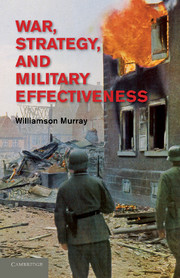Book contents
- Frontmatter
- Contents
- Introduction
- 1 History and the Future
- 2 Thucydides and Clausewitz
- 3 Clausewitz out, Computers in: Military Culture and Technological Hubris
- 4 Changing the Principles of War?
- 5 Military Culture Does Matter
- 6 History and Strategic Planning
- 7 Thoughts on Red Teaming
- 8 The Distant Framework of War
- 9 The Problem of German Military Effectiveness, 1900–1945
- 10 Reflections on the Combined Bomber Offensive
- 11 The Air War in the Gulf
- 12 Thoughts on British Intelligence in World War II and the Implications for Intelligence in the Twenty-First Century
- 13 The Meaning of World War II
- Index
- References
12 - Thoughts on British Intelligence in World War II and the Implications for Intelligence in the Twenty-First Century
Published online by Cambridge University Press: 07 October 2011
- Frontmatter
- Contents
- Introduction
- 1 History and the Future
- 2 Thucydides and Clausewitz
- 3 Clausewitz out, Computers in: Military Culture and Technological Hubris
- 4 Changing the Principles of War?
- 5 Military Culture Does Matter
- 6 History and Strategic Planning
- 7 Thoughts on Red Teaming
- 8 The Distant Framework of War
- 9 The Problem of German Military Effectiveness, 1900–1945
- 10 Reflections on the Combined Bomber Offensive
- 11 The Air War in the Gulf
- 12 Thoughts on British Intelligence in World War II and the Implications for Intelligence in the Twenty-First Century
- 13 The Meaning of World War II
- Index
- References
Summary
The Greek Thucydides, the greatest of all historians, suggested in the early passages of his work on the Peloponnesian War that it “will be enough for me, however, if these words of mine are judged useful by those who want to understand clearly the events which happened in the past and which (human nature being what it is) will, at some time or other and in much the same ways, be repeated in the future.” The problem with Thucydides’ claim is that history rarely suggests exact patterns. At best, it can provide illumination to help in understanding the complex problems that confront today's policy makers and military leaders. The best one can hope for from history is that it will suggest the right questions, or how to think more coherently and intelligently about current problems.
This chapter examines the development of British intelligence over the course of the Second World War for insights into how America's present-day intelligence organizations might consider and address their own problems. Admittedly considerable differences exist between the challenges the British faced and those confronting Americans today. Yet, there are also similarities that may help address the complex and intractable problems of the twenty-first century. At the least, the success of British intelligence in the Second World War would seem to suggest lessons adaptable to today's conditions.
- Type
- Chapter
- Information
- War, Strategy, and Military Effectiveness , pp. 283 - 310Publisher: Cambridge University PressPrint publication year: 2011



